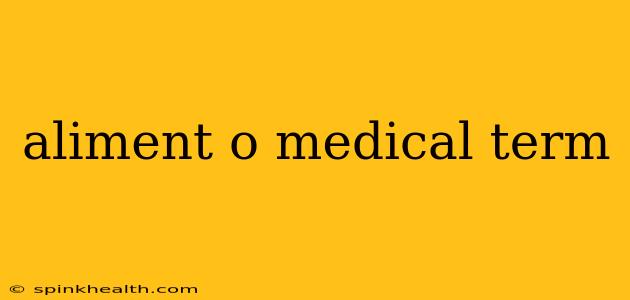Aliment: Unpacking the Medical Term and Its Nutritional Significance
The word "aliment" might sound unfamiliar in everyday conversation, but within the medical field, it carries significant weight. It's not a term thrown around casually; rather, it represents a foundational concept in understanding nutrition and its impact on health. Let's delve into what "aliment" truly means and explore its broader implications.
Imagine a bustling kitchen, the heart of a household. Food is prepared, nourishing meals are created, and sustenance is provided. "Aliment," in its essence, is a medical term referring to food or nourishment. It's a broad term encompassing everything from the basic building blocks of our diet – proteins, carbohydrates, and fats – to the vitamins, minerals, and other micronutrients that contribute to our overall well-being.
But it's more than just a simple definition. The term "aliment" speaks to the vital role nutrition plays in maintaining health and preventing disease. Understanding the role of different alimentary components is crucial for doctors, nutritionists, and anyone striving for optimal health.
What are the different types of aliment?
This is a question often linked with understanding the medical term "aliment." The types of aliment aren't neatly categorized in a clinical sense, but we can explore its components according to the macronutrients and micronutrients:
-
Macronutrients: These are the energy-providing nutrients we need in large amounts. This includes carbohydrates (found in grains, fruits, and vegetables), proteins (found in meat, beans, and dairy), and fats (found in oils, nuts, and avocados). Each type of aliment contributes differently to energy production, tissue repair, and overall bodily functions.
-
Micronutrients: These are vitamins and minerals needed in smaller quantities but are just as vital for health. Examples include Vitamin C (crucial for immune function), Vitamin D (essential for calcium absorption), and iron (necessary for oxygen transport). Deficiencies in these micronutrients can lead to various health problems, highlighting the importance of balanced alimentation.
-
Water: Often overlooked, water is a crucial aliment, essential for nearly every bodily process. It aids digestion, regulates temperature, and transports nutrients throughout the body. Adequate water intake is vital for optimal health.
What is the difference between aliment and nutrition?
While closely related, "aliment" and "nutrition" aren't interchangeable terms. "Aliment" refers to the food itself, the substance providing nourishment. "Nutrition," on the other hand, is the process by which the body takes in, absorbs, and uses the aliment to support growth, maintenance, and repair. It's the dynamic interaction between the food we consume and how our bodies utilize it. Aliment is the input; nutrition is the output.
How is aliment related to digestive health?
The term "aliment" is intrinsically linked to our digestive system's ability to process and absorb nutrients. Proper digestion is crucial for extracting the necessary elements from the aliment and preventing nutritional deficiencies. Factors influencing digestive health, such as gut microbiome balance and enzyme activity, directly affect how our bodies utilize the nourishment provided by aliment. A healthy digestive system is paramount for optimal absorption of all alimentary components.
Understanding the medical term "aliment" allows us to appreciate the intricate relationship between food, health, and well-being. It's not merely about sustenance; it's about the complex process of acquiring and utilizing the essential building blocks for a healthy and thriving life.

